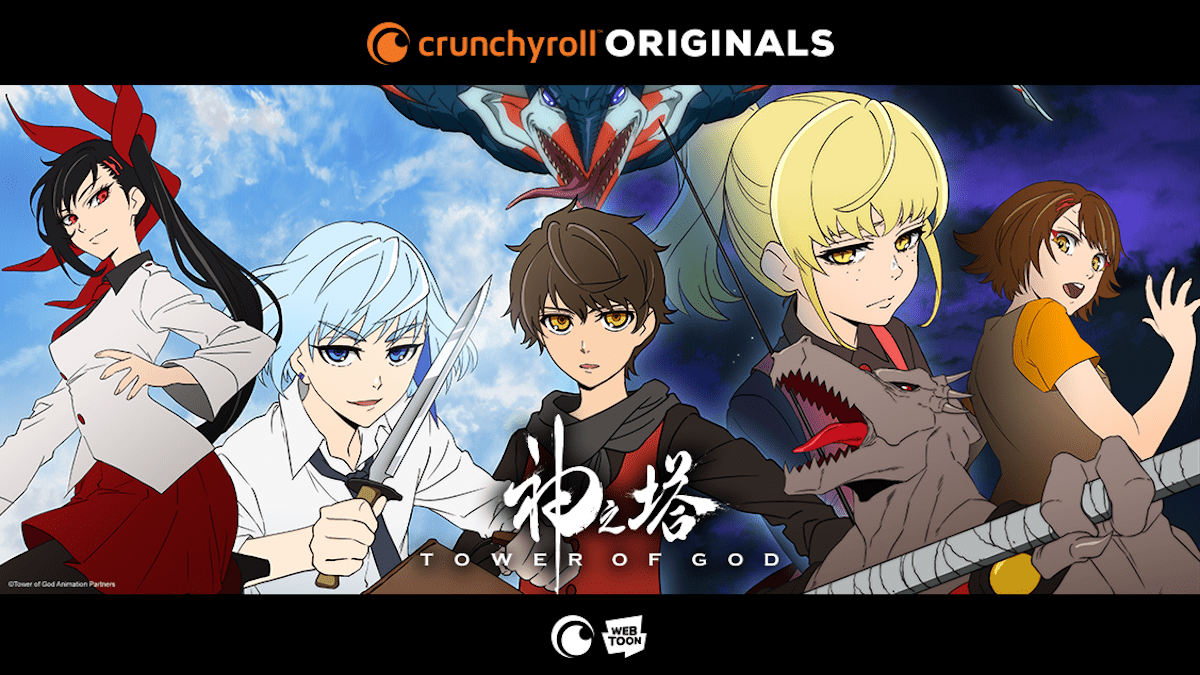English Dub Season Review: Tower of God Season One
Overview:
“Climb to the top of the Tower and you can have anything.”
This is the simple promise that kicks off Tower of God and also efficiently sums up the anime’s major plot. A massive and foreboding Tower hosts hundreds if not thousands of obstacles that prevent eager adventurers from reaching the top. The top of the Tower promises such insane luxuries and it naturally brings a range of proficient individuals into the fray. Most of these competitors have aspirations for impossible wishes, but Bam—the series’ protagonist—truly just wants to reunite with his friend, Rachel. Bam heads into the Tower in pursuit of Rachel he gets tested in extreme ways and develops a tight knit group of friends. No one in Tower of God can fully be trusted, but the series mixes together personal struggles with universal problems to create something special. Bam’s journey is only just beginning, but Tower of God does an impressive job at building this radical new world that these characters find themselves in.
Our Take:
There are a lot of shounen anime at this point. In fact, there are too many, but the popular genre is clearly not going away. The glut of this kind of content can give some audience’s reservations when yet another shounen anime series comes along, but it also means a whole lot more when one of these series can defy expectations and genuinely do something different. Tower of God is an anime that revolves around a mysterious and magical Tower that presents itself as one thing, only for it to be vastly different in reality. Brilliantly, Tower of God the anime pulls off the same kind of magic trick where it begins and acts like a basic shounen dungeon series, only for the show to pull the rug out from under the viewer as it steadily changes into more of a nihilistic character study that has a lot to say about society, human nature, and the desire to be seen.
Tower of God is kind of incredible for the long con that it pulls on its characters and audience. The anime creates a reassuring feeling as the series begins with a wealth of shounen action tropes. At the same time, Tower of God doesn’t have any disdain for these archetypes. It plays into them well and still tries to find fresh angles on old ideas. However, all of these causes the audience to slowly lower their guards before the series’ true intentions become clear. By then, it’s already too late and Tower of God has ensnared its audience. It takes its time, but Tower of God executes one of the more shocking pivots that I’ve seen in an anime since The Promised Neverland. This helps add a ton of complexity to a series that can be very easy to write off, based on how it looks and sounds.
Like many shounen anime, Tower of God is goal-driven, but the eclectic group of characters that populate the show are one of the best things about it. Bam, Khun, Anaak, and Endorsi are all fantastic characters. The only problem with this is that with such a huge cast there are inevitably characters that get neglected. Tower of God does a lot of justice to its core cast and even though it can get a little preoccupied with Bam and Rachel at times, it tries its best to balance all of these different personalities. At the beginning it’s easy to lose track of everyone, but by the time that the season comes to a close there’s a really comfortable dynamic between the series’ large supporting cast. Less important characters like Paracule or Shibisu become welcome spectators that can add a lot to scenes, even if they’re not directly involved with them.
Another area in which Tower of God really excels is the anime’s fight scenes, which offer a ton of variety, whether that’s through the different characters and their respective fighting styles or the different weapons that everyone brings to the table. Tower of God also frequently mixes things up and shifts between one-on-one fights and more sprawling free-for-alls. The introduction and growth is Shinsu is another fascinating facet to all of this, too. The 13 Month Series weapons are amazing and also add a lot to the season’s fight scenes, but Tower of God really doesn’t do much with them.
As much as Tower of God excels with the world building that it does, it also feels like there are plenty of details from the manhwa that have probably not made it into the series. I’d be surprised if the next season of the show didn’t reveal a lot more about these powerful and rare weapons, but it’s still a little awkward for some episodes to spend so much time on these relics, only for them to later be discarded entirely for large stretches of time. Admittedly, the emotional turmoil that’s stirred between the characters leads to some of the season’s most effective moments, but all of the fights (especially Anaak’s) are easy highlights. It’s also continually satisfying to watch these clever characters try to re-write the rules of the Tower and level the playing field in a game that still seems infinitely rigged against them.
The animation in Tower of God isn’t overdone or too fancy, but it’s neatly stylized in a way that works for the material and really does look attractive. Additionally, there’s some wonderful music in this series that always finds the best way to compliment the visuals at hand. There are a handful of tracks that become unexpectedly epic at times and compliment the high stakes of certain episodes. Tower of God is also the perfect example of a show where initially the opening and ending themes seem tolerable, but then after a few episodes you’re heartily singing along with them.
As Bam and company get deeper into the Tower, there’s an early emphasis on tests, puzzles, and riddle-like challenges. This more intellectual side meshes together with action scenes and psychological mind games. I brought up the series Death Parade during my initial dissection of Tower of God, but these earlier installments that have a more episodic approach really conjure this energy where feats of strength are more so just a conduit to learn about the cast.
By the end of the season, Tower of God has become considerably more complex than where it begins, but despite this, some of these earlier episodes like “The Correct Door” and “The Crown’s Fate” are still some of the season’s best entries due to how they explore character. This dynamic is missed in the later episodes and as Tower of God grows more mature, it remains unclear if season two will return to the more playful and episodic approach to tests, or if the characters are now past the point of no return and ready for more serious business.
Tower of God is engrossing right from the start and it effectively balances story progression with mystery to ensure that each stage of this journey remains suspenseful and exciting. Despite this consistent quality, Tower of God jumps to an upper echelon and turns into a very different beast in its final episodes. The anime embraces its darker impulses and it establishes a new tonal precedent that seems like it will be very important heading into season two.
There is absolutely an innocence to the first season of Tower of God, whether it’s in Bam’s literal naivety towards the challenges that he faces or the way in which this anime holds the audience’s hand at times. That innocence is now lost and while Tower of God’s second season will likely not be a completely different show, it does feel like it has more potential under this new nihilistic framework.
Season two of Tower of God promises some massive changes that the series will hopefully stick with. The prospect of Rachel stepping into the spotlight as others blindly support her all while Bam recuperates in the shadows has a lot of potential. I’d love for Tower of God to really embrace Rachel’s evil side and show just how manipulative she can be. Bam is definitely still blinded by Rachel, but hopefully the second season will finally allow him to smarten up and rise against her. It’d be very satisfying to see Bam turn things around on Rachel and play a similarly long game against her, only to turn the tables at the last minute.
This new power dynamic between Rachel and Bam will definitely be a dominant factor in season two, but there are a number of smaller storylines that remain unresolved. Plot threads like the growing tension between Khun and his family or the relationships between the Princesses of Jahad will likely also be important next season. All of these elements and added stressors make it seem like Tower of God’s second season will be better in every way, especially now that a lot of the heavy lifting and character development is out of the way.
Tower of God is now in a fortunate position, which it hopefully won’t squander. A lackluster and repetitive sophomore season could burn up a lot of their goodwill and have Tower of God devolve into every other shounen series. With many big anime series beginning to come to an end, Tower of God has the potential to really fill the void.























"There are also other characters that come and go (also owned by the Warner Bros. Discovery conglomerate media company)."
Huh. Is that just referring to other characters from the show itself, or is this implying that the new season is going to have cameos from other WBD IPs